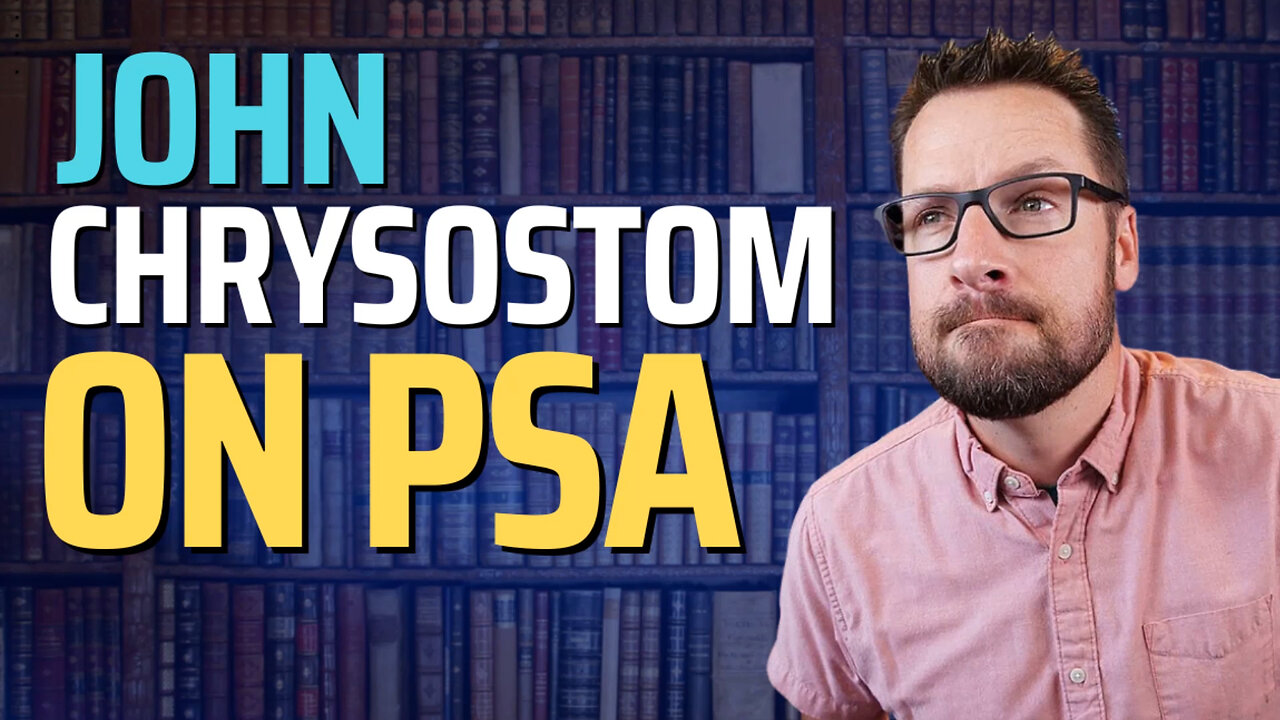Premium Only Content

Mike Winger Critique Episode 4: Did John Chrysostom Teach PSA?
Warren McGrew and Paul Vendredi address Reverend Mike Winger's claim that John Chrysostom, a Church Father living in the theological golden age of the 4th century, professed penal-substitutionary atonement (PSA).
Rev. Winger’s interpreting Chrysostom's phrase "in our stead" fails to recognize that this phrase can be accommodated by multiple working hypotheses. Paul explains that six competing atonement models all use the phrase "died in our stead" or "in our stead," but the meaning varies depending on the model. Only the PSA model interprets those phrases to mean "punished in our stead"--an interpretation proven wrong by four disconfirming data.
Winger also errs in assuming that death equals punishment. Warren then introduces Father Panayiotis Papageorgiou, an expert on John Chrysostom, whom he had invited to his show to discuss the Orthodox faith. Papageorgiou, noted for his expertise in John Chrysostom and his translation of the saint's homilies, asserts that Chrysostom believed that God did not give death as a punishment, but rather as a means to stop the line of sinning. This perspective was missed in the Western tradition due to the influence of Augustine. Papageorgiou emphasizes that God is not an angry father, but a loving one who went to great lengths, including dying on the cross, to convince humans of His love. Papageorgiou laments the fragmented theology in the Western Church and its emphasis on various atonement theories, which he believes have diminished the incarnational and resurrection theology of Christianity.
While acknowledging Winger's strong argument from Chrysostom's homily on 2 Corinthians 5:21, Paul expresses frustration that Winger did not provide citations for his quotes from Chrysostom, noting the saint's prolific writing and the challenges of finding specific citations in his vast body of work. Paul criticizes Winger for taking an isolating approach to Chrysostom's analysis, suggesting that other Church Fathers, such as Gregory of Nazianzus and Ambrose of Milan, provide better interpretations of the passage. According to Ambrose of Milan, terms like "sin," "curse," and "infirmity" refer to the human condition that Christ assumed in order to heal, not a one-to-one identification with human sin.
If Chrysostom taught PSA, one would expect to find consistent references to it throughout Chrysostom's works. Yet when one looks at the saint’s most important work, the Liturgy of John Chrysostom, used in Eastern Orthodox and Byzantine Catholic parishes, one finds no evidence for PSA. The second part of this liturgy involves the transformation of bread and wine into the body and blood of Christ. According to Eastern Orthodox theology, this is where the congregation mystically enters into the one-time sacrifice of Christ. However, contrary to the PSA model, there is no mention of penalties or substitutions in the anaphora, which initiates the transformation of the elements.
Warren notes differences in hymnology between older and newer Protestant traditions, with the older hymns focusing more on redemption, rescue, and deliverance, while the newer hymns lean towards PSA and its punitive language.
-
 4:20:46
4:20:46
Right Side Broadcasting Network
7 hours agoLIVE: President Trump Meets With Japanese Prime Minister Ishiba - 2/7/25
150K30 -
 2:01:23
2:01:23
The Dilley Show
4 hours ago $11.82 earnedVought Confirmed, Elon Loves Trump and Q&A Friday! w/Author Brenden Dilley 02/07/2025
46.5K7 -
 1:57:39
1:57:39
The Charlie Kirk Show
4 hours agoThe Greatest Deportation Wave in History + AMA | Homan | 2.7.2025
111K65 -
 2:02:15
2:02:15
LFA TV
19 hours agoMAINSTREAM MAGA! | LIVE FROM AMERICA 2.7.25 11am
88.6K61 -
 1:17:37
1:17:37
Game On!
5 hours ago $2.12 earned5 SHOCKING Super Bowl Stats and Trends!
48.4K2 -
![[Ep 601] USAID / CIA | Panama | Guest Sam Anthony of [your]NEWS](https://1a-1791.com/video/fwe2/b0/s8/1/E/U/D/u/EUDux.0kob-small-Ep-601-USAID-CIA-Panama-Gue.jpg) 2:01:29
2:01:29
The Nunn Report - w/ Dan Nunn
3 days ago[Ep 601] USAID / CIA | Panama | Guest Sam Anthony of [your]NEWS
33.9K11 -
 58:57
58:57
The Dan Bongino Show
7 hours agoDOGE Uncovers More Corruption Than We Ever Thought Possible (Ep. 2418) - 02/07/2025
853K1.93K -
 47:52
47:52
The Rubin Report
5 hours agoCalifornia Businessman Makes Joe Rogan Go Quiet with Never-Before-Told Details of LA Fires
102K38 -
 2:05:11
2:05:11
Benny Johnson
5 hours ago🚨INSURRECTION: Violent Democrats Storm DC Federal Buildings! Vow to Impeach Trump | 100K Feds Resign
155K417 -
 1:06:22
1:06:22
The Big Mig™
20 hours agoGlobal Finance Forum From Bullion to Borders
17K8